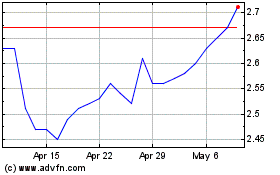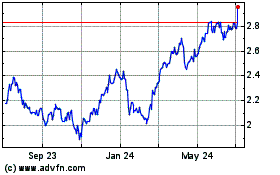By Sara Schaefer Muñoz, Jenny Strasburg and Giovanni Legorano
Europe's struggling banks were dealt a fresh blow Friday as the
U.K. voted to leave the European Union, sending share prices
plunging and fueling concerns about banks' long-term profits and
health.
Following an announcement of the 'Leave' decision, which was
largely unanticipated by Britain's financial sector, the Stoxx
Europe 600 Banks index fell 14% Friday, compared with a decline of
just 7% in the broader index. U.K. bank Barclays PLC was one of the
hardest hit, with its shares falling nearly 30% in early trading
before clawing back to close down 20%, at 153.51 pence.
Shares of banks on the Continent were also punished, with
Italy's UniCredit SpA closing down 23% and Spain's Banco Santander
SA down 20%, as investors feared the U.K.'s 'Leave' outcome would
both harm investment banks' cross-border business and spur an
economic slowdown that could weigh on consumer loans.
"Europe is weak already in terms of economic growth, and
[Brexit] isn't going to help matters," said Laith Khalaf, an
analyst for U.K. investment manager Hargreaves Lansdown. "That's
the risk you are seeing priced in today."
The British exit, or "Brexit," could disrupt trade with the
continent and harm the region's business sector, which could cause
loans to U.K. corporations to sour, said banks and analysts. French
bank Dexia SA said in a statement Friday that it "will closely
monitor its exposure counterparties in the United Kingdom," where
it has assets of EUR22 billion in both the U.K. public and private
sector.
The exit also opens up a two-year period of uncertainty as the
U.K. negotiates its withdrawal from the union.
It presents "heightened levels of complexity and uncertainty to
financial institutions and markets alike," said former Deutsche
Bank AG co-CEO Anshu Jain, who is now advising financial firms.
Banks reliant on their investment-banking units also suffered
Friday, since their London-based cross-border trading and clearing
operations could face disruption or relocation when the U.K. severs
ties with bloc. They may also have to grapple with new or complex
regulation.
"You've got a real muddle of issues," said Joseph Lynyak, a
banking regulatory partner at U.S. law firm Dorsey & Whitney.
"Sorting them out could be costly and problematic."
Shares of Switzerland's Credit Suisse Group AG closed down
13.94% and shares Deutsche Bank, Germany's biggest lender, were
down 14.13% at the close, to EUR13.36.
Across executive suites and office buildings in London's
financial heart on Friday the mood was generally one of disbelief
and disappointment, said bankers and executives, as they woke up to
falling share prices and the possibility that London could lose its
place as a global financial hub.
"I'm afraid that this is not such a good day for Europe,"
Deutsche Bank Chief Executive John Cryan said in a statement. "At
this stage, we cannot fully foresee the consequences, but there's
no doubt that they will be negative on all sides."
J.P. Morgan Chase & Co. CEO James Dimon, with
asset-management chief Mary Erdoes and corporate and investment
bank head Daniel Pinto, told employees in a joint morning note that
the U.K. vote was a "seminal moment" that could cause the bank to
move employees and restructure parts of its business. The details
can't yet be known, they wrote, and for now client relationships
are unchanged.
The U.S. bank has 16,000 employees in the U.K., the executives
wrote: "Regardless of today's outcome, we will maintain a large
presence in London, Bournemouth and Scotland, serving local clients
as we have for more than 150 years."
But Luca Azzani, a consultant at headhunting firm TW Partners
who had stepped outside his central London office Friday, wasn't
optimistic about London banks post the Brexit vote.
"They will fire people because many deals will be on standby, a
lot of people won't be able to be useful in the short-term, and it
could be difficult to hire people when the sterling is so low," he
said.
Trading desks at large banks in London reported a sharp slowdown
by midday Friday, with liquidity for trades decreasing as investors
clung to their cash amid uncertainty. Other bank desks braced for
hedge fund clients' losses or gains made on bets during the wild
market swings.
Bank executives said there was no pressure on interbank funding,
which is crucial to keep financial markets functioning. The Bank of
England and the European Central Bank have made billions of euros
and pounds available to prevent a 2008-style credit crunch with the
referendum vote.
Some executives felt the sharp selloff in bank stocks Friday was
overdone.
Gianni Franco Papa, deputy general manager of UniCredit, shares
of which closed down 23.7% Friday, said it is too early to make
forecasts on the medium-term economic and financial effect on the
U.K., Europe and the rest of the world and said London will remain
an international financial hub.
"It would take years to build a new financial center in Europe
comparable to London. As a consequence we have no plans for any
material changes in the near future," he said.
In Spain, where the referendum outcome hammered the shares of
all Spanish banks, a team of executives at a major domestic Spanish
bank used their Friday morning meeting to instruct bankers in their
branch network to head off any panic and to reassure British
citizens who have mortgages with the lender.
Albert Coll, institutional policy and market relations director
for Spain's Banco de Sabadell SA, also felt investors were too
quick to dump bank shares. Sabadell's share price plunged 19.3% on
Friday, in part because of its exposure to the U.K. where it bought
TSB Banking Group PLC last year.
"Sometimes, the average individual on the street has a
longer-term perspective than people sitting in the city, who react
on a short-term basis," said Mr. Coll, noting that even if the
pound falls as much as 10% this year, that would trigger a
manageable 2% decline in Sabadell's net profits. "The right
attitude is to wait and see what agreements are negotiated between
the U.K. and other countries."
--Jeannette Neumann and Lucy Burton contributed to this
article.
Write to Sara Schaefer Muñoz at Sara.Munoz@wsj.com, Jenny
Strasburg at jenny.strasburg@wsj.com and Giovanni Legorano at
giovanni.legorano@wsj.com
(END) Dow Jones Newswires
June 24, 2016 14:35 ET (18:35 GMT)
Copyright (c) 2016 Dow Jones & Company, Inc.
Lloyds Banking (NYSE:LYG)
Historical Stock Chart
From Mar 2024 to Apr 2024

Lloyds Banking (NYSE:LYG)
Historical Stock Chart
From Apr 2023 to Apr 2024
